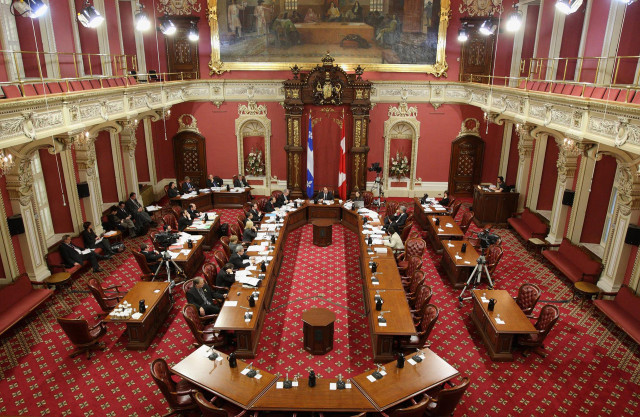Why we should support Quebec’s media
With the Quebec government preparing to hold consultations on the future of the news media, Marie-Ève Martel suggests some potential solutions to counteract the effects of the crisis rocking the media and keep information accessible.

News media outlets have seen their revenues drop dramatically over the past few years, forcing them to reinvent themselves to recover profitability and, more importantly, avoid disappearing. In the short term, the survival of Quebec’s media outlets depends on the support they receive from entire communities.
Many advertisers have moved to digital solutions, such as Google and Facebook, to the point that these platforms and similar ones have secured 80 per cent of online advertising investments in Quebec and Canada. This even includes government advertisements, of which 50 per cent or more can be found on such platforms.
In addition, Bill 122, adopted in 2017, allows municipalities to remove their public notices from newspapers and display them only on their websites. The savings generated by this change represent less than one per cent of the cities’ global budgets, but for newspapers, these sums could cover the salaries of several journalists.

Purchases of advertising space from Web giants by Quebec jumped from $2.8 million in 2016-2017 to $6.1 million in 2017-2018. Ottawa’s Agency of Record invested more than $18 million in digital advertising, or 65% of the expenditures it made on behalf of federal government departments and agencies.
Moreover, since the vast majority of news stories are available online for free, press outlets are seeing revenues from the consumption of their content decrease. A 2018 study revealed that less than one Canadian in 10 now pays to get the news.
As a result, media organizations continue to produce news at great expense, but no longer benefit from returns on their investments in the form of subscriptions, advertisements and public announcements, which are essential to financing their operations.
It is therefore unsurprising that nearly 50 weekly newspapers, as well as several digital media and radio stations, have gone out of business over the past seven years in Quebec. Many other outlets will face a similar fate if nothing is done to reverse this trend.
The crisis facing the news media undermines the public’s right to information that is accurate, verified and verifiable. In addition, it is a threat to one of the pillars of democracy.
Stay informed, subscribe to the FRIENDS newsletter
You are a few fields away from becoming a friend.
Ultimately, the disappearance of media outlets means the public will no longer have access to the diversity of news sources needed to gain an informed perspective on current issues. This is especially alarming given the rise of fake news on the Internet.
The crisis facing the news media undermines the public’s right to information that is accurate, verified and verifiable. In addition, it is a threat to one of the pillars of democracy. By its very definition, the public right to information implies that this information is a public good. And as with any public good, it is everyone’s responsibility to ensure its protection and sustainability.

Starting August 26, Quebec will be holding hearings on the future of information media.
Better late than never, as the saying goes.
It is with this perspective that the federal government set aside $595 million over five years to support the media through three tax credits: one that can be applied to the payroll expenditures of newsrooms, one for online subscriptions to Canadian news outlets, and a third for charitable donations to news outlets designated as non-profit organizations. The eligibility criteria was defined over the summer, so we can expect the first cheques to be sent out to media outlets in the next few months—hopefully, it won’t be too late.
In late August, Quebec’s provincial government will establish a parliamentary committee on the future of the province’s media. More specifically, it will focus on preserving the public’s right to information. The committee could lead to measures to support news outlets; what they will consist of remains to be seen.
- How to avoid the coming cultural apocalypse
- Franco-Canadian civic life in the age of social media: The good, the bad and the necessary
- Where is local news in the Facebook age?
Already, by subjecting Big Tech to Quebec’s provincial sales tax and setting aside $64.7 million over five years to help print media move towards digitization, the Quebec government is taking steps in the right direction.
It is also worth noting that the National Assembly unanimously passed a motion to bring back substantial investments in Quebec’s news media. This is another measure that will help the province’s press outlets without impacting the journalistic independence they need to properly carry out their work.
What else could be done?
The Quebec government could follow Ottawa’s lead by implementing tax credits for the payroll expenses of media outlets. This could help fund the production of information without interfering with the editorial process. In the cultural sector, such tax credits are already available to people working in the movie, television and book publishing industries. Local news outlets fulfill a cultural role and should have access to a similar form of financial assistance.
None of these measures will have any long-term success unless something is done to revive the public’s interest in the news. That’s why the Quebec government should focus on financially supporting media literacy.
It could also set up a fund dedicated to content creation in Quebec’s various regions, based on calls for projects. Several media outlets currently can’t afford to fund investigations or to free up journalists to conduct them on a full-time basis. This fund could be supplied by several ministries and private organizations. Like the Fonds québécois en journalisme international, this fund could be administered by an independent non-profit organization.
Still, none of these measures will have long-term success unless something is done to revive the public’s interest in the news. That’s why the Quebec government should also focus on financially supporting media literacy. The entire population would benefit from understanding how a high-quality news story is produced, and learning how to consume this information and distinguish it from fake news. This way, professional and serious news media outlets could regain their standing with a large segment of the Quebec population that has abandoned them.
These suggestions may not be enough to ensure the survival of all media outlets in Quebec, but they could at least provide Quebeckers with a sufficiently diverse array of information sources to keep them informed on current issues.
Without the news media, the Quebec population would be unaware of what is going on in the province. And the province, with the exception of its capital and Montreal, could become a huge information desert if nothing is done.

